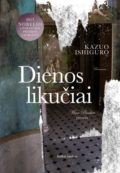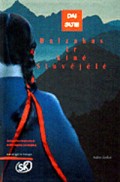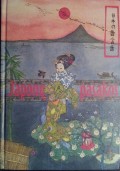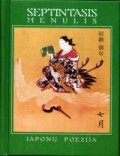 Authors:
Authors:
Ishiguro, Kazuo
Translated by:
Žukaitė, Mėta
Translated from:
English
Published on:
2000
“..for a great many people, the evening is the most enjoyable part of the day. Perhaps, then, there is something to his advice that I should cease looking back so, much, that I should adopt a more positive outlook and try to make the best of what remains of my day.” – with these words, in last pages of Kazuo Ishiguro novel “The Remains of the Day” the main character, an elderly English butler named Stevens, tries to encourage himself to turn over a new leaf and leave his past More
 Authors:
Authors:
(Lietuvių) Dai Sijie
Translated by:
(Lietuvių) Agnė Ranonytė
Translated from:
(Lietuvių) Prancūzų k.
Published on:
(Lietuvių) 2000
Dai Sijie (born 1954) is a famous chinese-french author and director. During the Cultural Revolution he was sent to a reeducation camp. After his return, he finished his studies and got a degree in art history. After some time, he exchanged China to France. Ever since, he lived and created art in France, where he discovered his passion for filmmaking and writing in the first place. He wrote his first novel „Balzac and the Little Chinese Seamstress“ he wrote in France, but its action took place in rural place in China, called Sichuan, where he, as a young man was sent to reeducate himself. Without these similarities between his life and novel‘s plot, there‘s a fact, that we was a tailor, that leads to believe that he was very influenced by his own life writing his first piece. More
 Translated by:
Translated by:
Dumčius, Vytautas
A collection of poetry by famous Japanese poets.
 Translated by:
Translated by:
Dumčius, Vytautas
Translated from:
Japanese
Published on:
1999
Nihon no Mukashibanashi (日本の昔話) – old Japanese tales consists of folk stories and legends talking about heroes and gods from the past. “Japonų pasakos“ (1999) – is the first book of the most popular Japanese folk tales translated into Lithuanian from the original language. This book consists of 32 short and easy to read tales and legends. Many stories are written in a casual way and tell about everyday situations in a very creative and slightly humorous way. Plot sometimes goes in unexpected direction which makes the story interesting to read. Many of the stories are closely connected with agricultural rituals, farm work (rice planting, harvesting), that‘s why it is partly similar to Lithuanian folk stories where seasonal agricultural work plays important part. Overall, diligence and earnestness towards work is probably the most frequently mentioned value: hard working men and sluggard’s life are compared. Latter usually is punished by gods or destiny, but in some stories motive aren‘t clearly displayed. More
 Translated by:
Translated by:
Žilaitytė, Joana Danutė; Baltuškevičius, Vladas; Baniulis, Julius; Geda, Sigitas; Juškaitis, Jonas; Kajokas, Donaldas; Karčiauskas, Mykolas; Korsakas, Kostas; Mackus, Algimantas; Neimantas, Romualdas; Patackas, Gintaras; Sruoga, Balys
More
 Authors:
Authors:
Yuan Mei
Translated by:
Kajokas, Donaldas
Translated from:
Russian
Published on:
1999
‘’What the Master Would not Discuss’’ by Yuan Mei is a rebellion against the system of Confucius, which denies strange things, violence, riots and supernatural creatures. The book contains a lot of stories. Using supernatural topics and characters, telling stories about ghosts, devils and corpses Y. Mei provokes people to get interested into magic. Most of his stories are closely related to the contraposition of life and death. The ghosts of dead people can transform into the human body and seek to punish the culprit. But there are good ghosts too. They observe the life of their relatives, help them or ask for help. More
 Authors:
Authors:
Rushdie, Salman
Translated by:
Jonušys, Laimontas
Translated from:
English
Published on:
1998
The Moor‘s last sigh is an intelectual story about the life of dying Moor, his thoughts and a confession before leaving this life. Parents and children relationships overlap in this large volume story same as thrilling events of life, eventualy India itself is revealed as a diverse and full of everything country, it is almost possible to smell it and feel all exotic spices. The author of the book S. Rushdie is known for his sharp tongue when talking about religion. He even touched four of them in this story – Christianity, Hinduism, Judaism and Islam. More
 Authors:
Authors:
Laozi
Translated by:
Dalia Švambarytė
A book of classical Chinese philosophy by Laozi, including comprehensive commentaries by professor of Beijing Pedagogic University Zhang Yi and an article “Laozi and Taoism Ideas in Postmodern era” by Antanas Andrijauskas.
 Translated by:
Translated by:
Mugenienė, Ilona
This book is a collection of Japanese fairy tales and myths from kojiki – the first Japanese book.
 Authors:
Authors:
Yoshimoto, Banana
Translated by:
Danieliūtė-Lapinskienė, Aušra
Translated from:
Italian
Published on:
1996
This is a story about a girl and a boy who meet under strange circumstances. They are brought together by the loved ones’ death. In the face of death timid, warm and pure love is born. The main character in the book, Mikage Sakurai, has difficulties coping with her beloved grandmother, the last of the relatives, death. In this challenging period of her life as if out of nowhere Juichi appears who helps her realise the loss. A strange friendship slowly occurs between two of them. Everything is diversified by a very colorful person – Juichi’s mother, who is actually his transvestite father. The idyllic life at the trio’s home, where the action is boiling in the kitchen, is disturbed by another unexpected death. More
 Authors:
Ishiguro, Kazuo
Authors:
Ishiguro, Kazuo 
 Authors:
(Lietuvių) Dai Sijie
Authors:
(Lietuvių) Dai Sijie  Translated by:
Dumčius, Vytautas
Translated by:
Dumčius, Vytautas  Translated by:
Dumčius, Vytautas
Translated by:
Dumčius, Vytautas  Translated by:
Žilaitytė, Joana Danutė; Baltuškevičius, Vladas; Baniulis, Julius; Geda, Sigitas; Juškaitis, Jonas; Kajokas, Donaldas; Karčiauskas, Mykolas; Korsakas, Kostas; Mackus, Algimantas; Neimantas, Romualdas; Patackas, Gintaras; Sruoga, Balys
Translated by:
Žilaitytė, Joana Danutė; Baltuškevičius, Vladas; Baniulis, Julius; Geda, Sigitas; Juškaitis, Jonas; Kajokas, Donaldas; Karčiauskas, Mykolas; Korsakas, Kostas; Mackus, Algimantas; Neimantas, Romualdas; Patackas, Gintaras; Sruoga, Balys  Authors:
Yuan Mei
Authors:
Yuan Mei  Authors:
Rushdie, Salman
Authors:
Rushdie, Salman  Authors:
Laozi
Authors:
Laozi  Translated by:
Mugenienė, Ilona
Translated by:
Mugenienė, Ilona  Authors:
Yoshimoto, Banana
Authors:
Yoshimoto, Banana